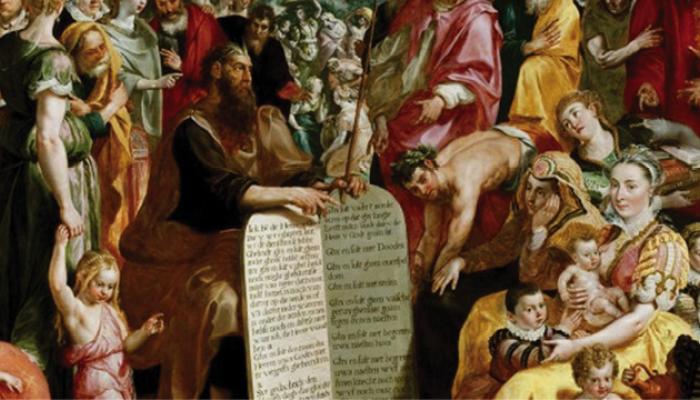
4.8 Quelle est la relation entre foi et action ?
Vivre en chrétien veut dire prendre être conscient de nos action (ce que nous faisons ou non), selon notre relation avec Jésus. Comme le dit la Bible : « La foi sans les œuvres est morte » (Jc 2,26)Jc 2,26 : Ainsi, comme le corps privé de souffle est mort, de même la foi sans les œuvres est morte.. Si tu crois vraiment en Jésus, alors tu feras ce qu’il te demande : aimer Dieu et ton prochain.
Une façon de montrer cet engagement est de respecter les Dix Commandements, même si nous n’y arrivons pas toujours. Dieu fait plus attention à l’amour que nous mettons dans nos dons que la valeur du don en lui-même (Mc 12,41-44)Mc 12,41-44 : Jésus s’était assis dans le Temple en face de la salle du trésor, et regardait comment la foule y mettait de l’argent. Beaucoup de riches y mettaient de grosses sommes. Une pauvre veuve s’avança et mit deux petites pièces de monnaie. Jésus appela ses disciples et leur déclara : « Amen, je vous le dis : cette pauvre veuve a mis dans le Trésor plus que tous les autres. Car tous, ils ont pris sur leur superflu, mais elle, elle a pris sur son indigence : elle a mis tout ce qu’elle possédait, tout ce qu’elle avait pour vivre. ». En tant que chrétiens, nous pouvons travailler au bien-être des autres êtres humains.
By what is love for the poor inspired?
Love for the poor is inspired by the Gospel of the Beatitudes and by the example of Jesus in his constant concern for the poor. Jesus said, “Whatever you have done to the least of my brethren, you have done to me” (Matthew 25:40). Love for the poor shows itself through the struggle against material poverty and also against the many forms of cultural, moral, and religious poverty. The spiritual and corporal works of mercy and the many charitable institutions formed throughout the centuries are a concrete witness to the preferential love for the poor which characterizes the disciples of Jesus. [CCCC 520]
What significance do the poor have for Christians?
Love for the poor must be in every age the distinguishing mark of Christians. The poor deserve not just a few alms; they have a claim to justice. For Christians there is a special obligation to share their goods. Our example in love for the poor is Christ.
“Blessed are the poor in spirit, for theirs is the kingdom of heaven” (Mt 5:3)—that is the first sentence in Jesus’ Sermon on the Mount. There is material, emotional, intellectual, and spiritual poverty. Christians must look after the needy of this earth with great consideration, love, and perseverance. After all, on no other point will they be evaluated by Christ so decisively as on their way of treating the poor: “As you did it to one of the least of these my brethren, you did it to me” (Mt 25:40). [Youcat 449]
When we hear, 'Your faith has saved you', we do not understand [God] to say absolutely that those who have believed in any way whatever will be saved, unless also works follow. [St. Clement of Alexandria, Stromata, Bk. 6, Chap. 14 (MG 9, 329)]





